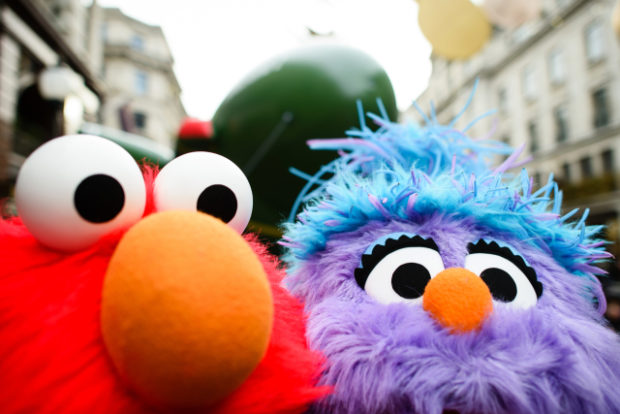
Sesame Workshop characters like Elmo have some new castmates. Image: AFP / LEON NEAL
Key figures in a new learning program for refugee children in camps in southern Bangladesh, Noor and Aziz embody serve as a model of education for Rohingya children.
Noor and Aziz, two new Rohingya muppets
Sesame Workshop, the non-profit educational organization behind the “Sesame Street” series on Thursday unveiled two new characters in its cast. Noor and Aziz, six-year-old Rohingya twins, will now feature alongside other “muppets” such as Elmo in video programming broadcast in refugee camps.
These two new puppets will address math, science and other programs directly taught to children in the camps.
“They will speak Rohingya,” the New York Times reported, “the language of a group of people that Myanmar authorities have refused to recognize as a legitimate ethnicity.”
Rohingya puppets that represent children
This work, carried out by Sesame Workshop, which helps ensure diversity in the television series, aims to give a positive image to these children by representing them in a program intended for them.
They are designed to be familiar to them, with very specific characteristics: the young girl, Noor, loves to learn and is very confident, while her brother, Aziz, is involved in the household chores of the home and has a passion for stories. But they are always placed on the same level.
Critical living and educational conditions
The Rohingya are a stateless ethnic group and are mainly from Myanmar and Bangladesh. Since 2016, nearly one million Rohingya have migrated to Bangladesh to flee ethnic massacre and are taking refuge in camps in the Cox’s Bazaar region of southern Bangladesh.
The children in these camps are numerous and “are among the most marginalized children on earth,” Sherrie Westin, Sesame Workshop’s president of social impact told The New York Times.
That’s why the program has expanded into a partnership with the Lego Foundation, the International Rescue Committee and Brac (a charity founded in Bangladesh) to educate, inspire and represent these children. CC
RELATED STORIES:
‘Sesame Street’ comforts children displaced by Middle East conflicts
‘We’re not alone’ – ‘Sesame Street’ tackles addiction in crisis